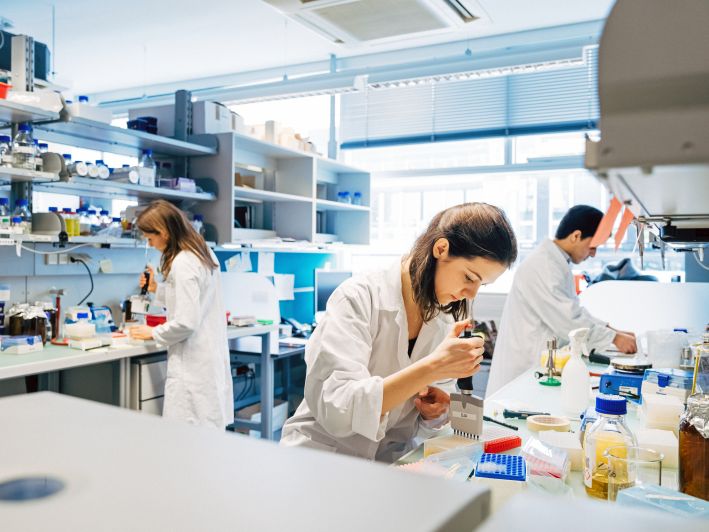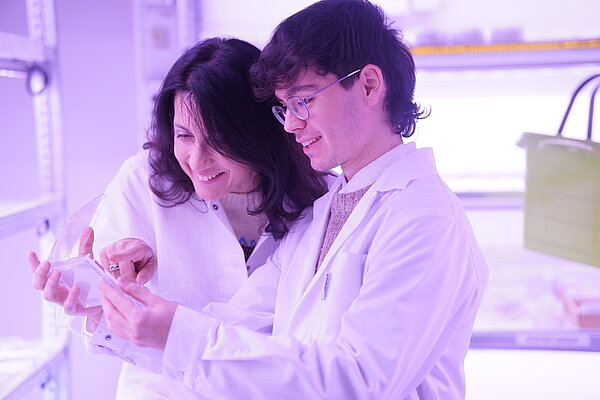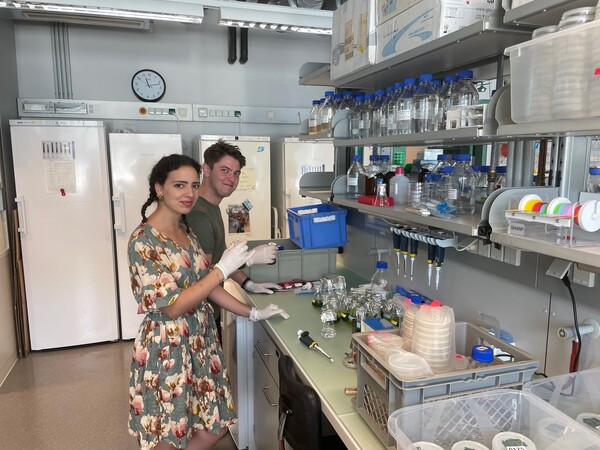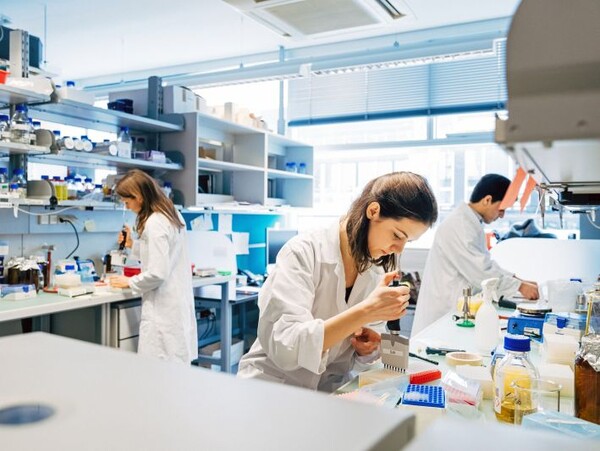The Gregor Mendel Institute (GMI) offers a distinguished international internship program where scientific curiosity meets practical…
I2P International Internship Program
I2P is a structured internship program for pre-doctoral students

Structured Internship Program at the Gregor Mendel Institute
The International Internship Program (I2P) of the GMI is for students interested in doing a PhD. I2P is a structured internship program that provides promising young scientists the opportunity to carry out cutting-edge research at one of Europe’s leading life science research centers. Interns will be fully integrated into a research group and will be an important part of the GMI community.
These competitive internships are targeted at students who have finished or are in their final year of a bachelor’s program and students enrolled in a Master's program in search of a hosting institute for their thesis. The internships offer:
- Full integration into a research group with access to GMI's core research facilities
- Training on how to perform scientific research at the highest level
- Guidance on career development and PhD opportunities
- A competitive salary
- Travel reimbursement for international students
Research at the GMI covers a broad range of topics including molecular, cellular, and developmental biology as well as biochemistry, evolution, and quantitative and population genetics.
In addition to being part of a research group at the GMI, the interns will participate in journal clubs, progress meetings, social activities, and a diversity of other mentoring events.
Requirements and Application documents:
- An academic CV that outlines academic training and details of previous internships (2 pages max.)
- A cover letter that (i) describes previous research experience, (ii) identifies the GMI research group that you would like to join, and (iii) explains the choice of the research group (1 pages max.)
- Contact details of two referees, one of which should be from a mentor who supervised a previous research project.
Applications:
The duration of the internships will be decided by individual groups but is expected to be between three and six months. There will be two application deadlines each year. For summer internships, the application deadline is April1st and the students are expected to start in the following June or July. For the winter internships, the application deadline is December 1st and students are expected to start in the following February. Applications should be sent as a single PDF file (Surname_Name.pdf) to internships(at)gmi.oeaw.ac.at.
Publications by GMI Interns
Publications by GMI Interns
Interns at the GMI are assigned their own projects and contribute to published research. Following is a growing list of papers that have been co-authored by GMI interns, whose names are in bold.
2023
Phytochromes mediate germination inhibition under red, far-red, and white light in Aethionema arabicum.
Zsuzsanna Mérai#, Fei Xu, Andreas Musilek, Florian Ackerl, Sarhan Khalil, Luz Mayela Soto-Jiménez, Katarina Lalatović, Cornelia Klose, Danuše Tarkowská, Veronika Turečková, Miroslav Strnad, Ortrun Mittelsten Scheid.
Plant Physiology, 2023;, kiad138, doi: https://doi.org/10.1093/plphys/kiad138
A versatile CRISPR-based system for lineage tracing in living plants
Mattia Donà#, Gabriele Bradamante, Zorana Bogojevic, Ruben Gutzat, Susanna Streubel, Magdalena Mosiolek, Liam Dolan, Ortrun Mittelsten Scheid#.
bioRxiv 2023.02.09.527713; doi: https://doi.org/10.1101/2023.02.09.527713
2022
Plant autophagosomes mature into amphisomes prior to their delivery to the central vacuole
Jierui Zhao*, Mai Thu Bui*, Juncai Ma*, Fabian Künzl, Lorenzo Picchianti, Juan Carlos De La Concepcion, Yixuan Chen, Sofia Petsangouraki, Azadeh Mohseni, Marta García-Leon, Marta Salas Gomez, Caterina Giannini, Dubois Gwennogan, Roksolana Kobylinska, Marion Clavel, Swen Schellmann, Yvon Jaillais, Jiri Friml, Byung-Ho Kang#, Yasin Dagdas#.
J Cell Biol (2022) 221 (12): e202203139; doi: https://doi.org/10.1083/jcb.202203139
A hormone-activated mobile RNAi pathway defends plant stem cells from virus infection
Marco Incarbone#, Gabriele Bradamante, Florian Pruckner, Tobias Wegscheider, Wilfried Rozhon, Vu Nguyen, Ruben Gutzat, Thomas Lendl, Stuart MacFarlane, Michael Nodine, Ortrun Mittelsten Scheid.
bioRxiv 2022.12.18.520928; doi: https://doi.org/10.1101/2022.12.18.520928
2020
Arabidopsis shoot stem cells display dynamic transcription and DNA methylation patterns.
Gutzat R#, Rembart K, Nussbaumer T, Hofmann F, Pisupati R, Bradamante G, Daubel N, Gaidora A, Lettner N, Donà M, Nordborg M, Nodine M, Mittelsten Scheid O#.
EMBO J. 2020 Oct 15;39(20):e103667; doi: https://doi.org/10.15252/embj.2019103667
2014
How a retrotransposon exploits the plant's heat stress response for its activation.
Vladimir V. Cavrak, Nicole Lettner, Suraj Jamge, Agata Kosarewicz, Laura Maria Bayer, Ortrun Mittelsten Scheid#.
PLoS Genet. 2014 Jan 30;10(1):e1004115; doi: https://doi.org/10.1371/journal.pgen.1004115
* Authors contributed equally to this paper.
# Corresponding author.


